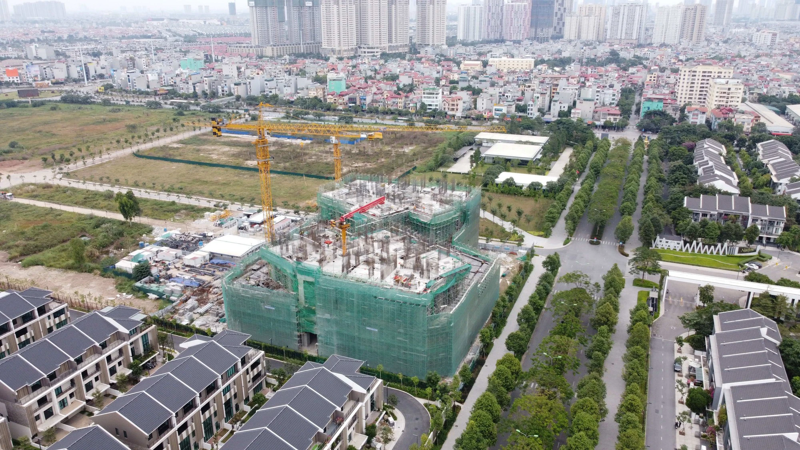Land use and rent fees under review
Much discussion has ensued in response to a new draft decree on land use and rent fees.

A draft decree from the Ministry of Finance (MoF) on land use fees and rents features a number provisions that have triggered concern among businesses about the potential for greater risks and possible disadvantages.
The Vietnam Chamber of Commerce and Industry (VCCI) recently provided feedback on the draft after consulting with businesses and analysts. The policy has been progressively institutionalized following market principles, it wrote, promoting transparency and equality across various economic sectors. It has also encouraged the efficient and economical use of land, gradually cut speculation, and minimized wasteful land use, contributing to the promotion and development of the country’s real estate market.
Despite such achievements, however, regulations on land use fees and land rents under the Land Law exhibit several limitations that must be addressed.
The Land Law 2024, enacted at the beginning of this year, introduced significant changes relating to land finance matters and assigned responsibility for specifying several such matters, including land use fees and rents, to the government.
In regard to financial obligations regarding land rents, the draft decree states that these obligations begin when the decision to lease land is made. The Law also mandates that businesses must pay the lease prior to using the land.
However, VCCI noted that, in many instances, businesses pay land use fees but State agencies fail to complete the site clearance process, resulting in significant delays in land handover, sometimes extending into several years.
Therefore, it suggested that the drafting agency amend the regulations to allow businesses to pay provisional land rents before the actual use of the land. If site clearance and handover proceed as scheduled, no adjustment to the land rents would be needed.
If land handover is delayed beyond the expected timeline, businesses would have the right to request that State agencies recalculate land rents, reducing their obligation proportionate to the period of delay. This reduction will be settled and deducted from future land rent payments or other financial obligations owed to the State.
Reductions lack appeal
Article No. 40 of the draft decree outlines the conditions for land rental fee reductions. Investment projects are to receive an 80 per cent reduction during the basic construction period, for a maximum of three years. After this period, projects will receive varying degrees of reductions for different durations, depending on whether the project falls within a preferential investment sector or is located in a region with challenging conditions.
Compared to the existing policy under Decree No. 46/2014/ND-CP (amended by Decree No. 135/2016/ND-CP), dated May 15, 2014, which regulates the collection of land rent and water surface rent, VCCI believes the proposed policy is less attractive. It notes that under existing regulations, many cases would be fully exempted from land rents, rather than just receiving a reduction for a limited number of years.
Examples of cases eligible for a 100 per cent land rent exemption for the entire lease term under existing regulations include investment projects in preferential investment sectors located in socio-economically disadvantaged areas; projects using land to build student dormitories funded by the State budget, where the managing unit is not allowed to include land rents in the rental price for students; agricultural land for ethnic groups; and land used for projects involving protective forest planting and coastal forest planting.
Therefore, VCCI recommended that the drafting agency consider expanding those eligible for land rent exemptions instead of merely reducing rents. It argues that using tax and land rent incentives to attract investment to disadvantaged areas or preferential sectors remains an effective strategy. Any reduction in these incentives should be carefully assessed for its impact on the socio-economic development of specific regions and sectors.
Additionally, the basic construction phase is often the most financially challenging for investment projects, especially major undertakings. Maintaining the policy of land rent exemptions would support business operations in such cases.
If exemptions were replaced by reductions in land rents, it would also introduce additional administrative procedures and increase the risk of error by both businesses or enforcement officers. Reductions will require determining the land rent prior to calculating the reduction, whereas an exemption eliminates such steps.
If the drafting agency believes that the current level of land rent exemption is too high and needs to be adjusted to be in keeping with the new circumstances, VCCI suggested reducing the number of years the exemption is offered rather than discounting rents each year.
Ensuring stability in land rentals
Article No. 153.2 of the Land Law mandates that annual land rents remain stable for a period of five years from the time of the State’s decision to lease the land. This allows for flexibility in land use changes and the transition to State land leases with annual rent payments.
The adjusted rate, as determined by the government in each period, must not surpass the national CPI rate posted in the preceding five years. Consequently, the law permits the government to set increases in land rents to either equal to or lower than the inflation rate. However, a contradiction arises in Article No. 32.2.a of the draft, which proposes an adjusted rate for increasing land rents that aligns with inflation.
Therefore, VCCI recommended that the drafting agency consider limiting the increase in land rents in each five-year cycle to no more than the CPI increase and not exceeding 15 or at times 20 per cent. This would help businesses mitigate their financial risks, encouraging them to invest in major projects with long capital recovery periods. This approach is consistent with the Land Law, which allows the government to set specific increases as long as these do not exceed the CPI increase. If the CPI rises by more than 15 per cent, a 15 per cent increase in land rents set by the government would still be in compliance with the law.
Regarding the stability of land rents in the event of planning adjustments, Article No. 32.2.b of the draft states that if there is a planning adjustment, the land rent for the subsequent cycle may increase by up to double the stabilized rent in the previous cycle. However, according to VCCI, this could be a substantial increase and may not align with Article No. 153.2 of the Land Law.
The 2024 Land Law significantly reduces instances of land being leased with a one-time payment, shifting to annual payment leases instead. However, this recent change would introduce uncertainty for businesses on future land rent costs.
To address this, the Law should cap land rent increases to once every five years, with each not exceeding the CPI rate. Such a cap should apply universally, regardless of planning adjustments. Therefore, VCCI recommended that the drafting agency eliminate the provision in Article 32.2.b of the draft.







